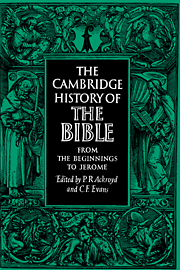Book contents
- Frontmatter
- I LANGUAGE AND SCRIPT
- II BOOKS IN THE ANCIENT WORLD
- III THE OLD TESTAMENT
- IV THE NEW TESTAMENT
- V THE BIBLE IN THE EARLY CHURCH
- 13 BIBLICAL EXEGESIS IN THE EARLY CHURCH
- 14 ORIGEN AS BIBLICAL SCHOLAR
- 15 THEODORE OF MOPSUESTIA AS REPRESENTATIVE OF THE ANTIOCHENE SCHOOL
- 16 JEROME AS BIBLICAL SCHOLAR
- 17 AUGUSTINE AS BIBLICAL SCHOLAR
- 18 THE PLACE OF THE BIBLE IN THE LITURGY
- Bibliography
- Abbreviations
- Notes on the Plates
- Indexes
- Plate Section">
- References
13 - BIBLICAL EXEGESIS IN THE EARLY CHURCH
from V - THE BIBLE IN THE EARLY CHURCH
Published online by Cambridge University Press: 28 March 2008
- Frontmatter
- I LANGUAGE AND SCRIPT
- II BOOKS IN THE ANCIENT WORLD
- III THE OLD TESTAMENT
- IV THE NEW TESTAMENT
- V THE BIBLE IN THE EARLY CHURCH
- 13 BIBLICAL EXEGESIS IN THE EARLY CHURCH
- 14 ORIGEN AS BIBLICAL SCHOLAR
- 15 THEODORE OF MOPSUESTIA AS REPRESENTATIVE OF THE ANTIOCHENE SCHOOL
- 16 JEROME AS BIBLICAL SCHOLAR
- 17 AUGUSTINE AS BIBLICAL SCHOLAR
- 18 THE PLACE OF THE BIBLE IN THE LITURGY
- Bibliography
- Abbreviations
- Notes on the Plates
- Indexes
- Plate Section">
- References
Summary
PRIMITIVE CHRISTIAN EXEGESIS
The exegesis of the primitive Christian Church was a direct and unself-conscious continuation of the type of exegesis practised by ancient Judaism in its later period. This Jewish exegesis had a number of traditional methods and characteristics which can all be recognised without difficulty when they are reproduced in early Christian exegesis, and some of them can be identified in the New Testament itself. The most important function performed by exegesis in ancient Judaism was the interpretation of the Law (Torah). The rabbinic schools set themselves the task of making the large collection of legal enactments, sagas, myths, stories, histories and cult material, which we call the Pentateuch, into a code of law capable of covering the whole life, inner as well as outer, cult as well as conduct, of communities of Jews living under quite different circumstances and in a much later age. In order to achieve this formidable task, they found it necessary to produce a complex and flexible technique of exegesis. Inconsistencies in the biblical text had to be explained away; errors, redundancies, absurdities, or anything shocking, indecent or unworthy of divine inspiration had to be removed. Every verse was regarded as potentially independent of the others and capable of interpretation without any reference to its context. It was necessary largely to ignore the historical background. Rules were made whereby the natural, historical sense of any text could be evaded, and sometimes a quite unnatural, symbolic sense could be read in. A cautious, Torah-directed form of allegory was born. Several examples of it can be found in the New Testament.
- Type
- Chapter
- Information
- The Cambridge History of the Bible , pp. 412 - 453Publisher: Cambridge University PressPrint publication year: 1970
References
- 2
- Cited by

